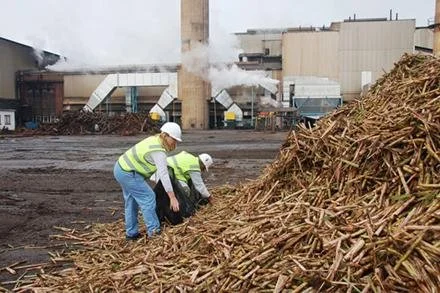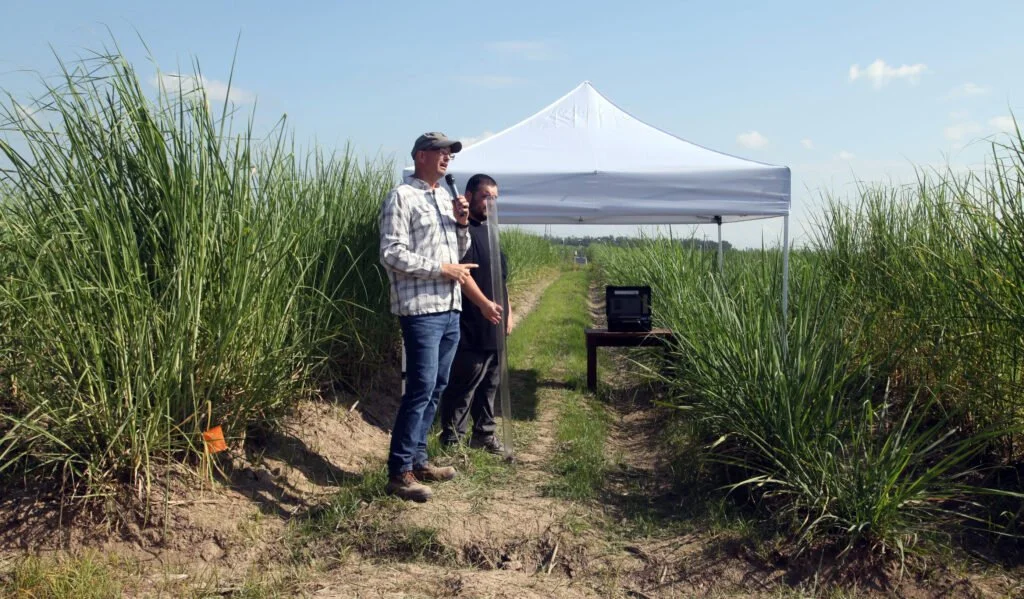Sugarcane producers who walk the fine line between drawing down a heavy load of sugar and supporting strong biomass production recently encountered a yield challenge from their standard ripener treatment. The symptoms are delayed emergence, fewer shoots, and lighter stalks. The overall impact of the malady is a smaller ratoon crop.
Read MoreThe sugarcane aphid, Melanaphis sacchari (Zehntner, 1897), is a tiny, invasive insect that feeds on sugarcane plants and other grasses, predominantly grain sorghum.
Read MoreChemical ripeners for sugarcane in Louisiana provide an important benefit. When properly applied, ripeners can maximize recoverable sugar and minimize cane yield (tonnage) losses.
In 2023, the following glyphosate formulation is recommended as a chemical ripener: Roundup PowerMAX 3. Roundup PowerMax 3 contains 4.8 pounds of glyphosate acid per gallon and is formulated as a potassium salt.
Read MoreJames “Jim” Simon of New Iberia was honored as the recipient of the Kermit Coulon Sr. Outstanding Service Award at the 62nd St. James Appreciation Supper held in Vacherie at the Westbank Reception Hall July 27.
Leonard “Lenny” Waguespack, committee chair of the St. James Parish Agricultural Tour, said Simon was an obvious choice.
Read MoreU.S. sugarcane producers watching historically high world raw sugar prices can expect both the world and domestic markets will stay healthy in the long-term, LSU agricultural economist Michael Deliberto said.
That’s good news for farmers hoping to capitalize on an improved profit opportunity.
Read MoreLast year, Louisiana led the nation in sugarcane production. Much of that credit goes to the variety development done at the LSU AgCenter Sugar Research Station. The station held its annual field day to highlight their latest research. LSU AgCenter correspondent Craig Gautreaux was there and has this report.
Read MoreThe average American consumes 17 teaspoons of sugar per day, about half from sugarcane. It takes a lot of raw material to create all that sweetness, but there is a downside – what do you do with all the leftover sugarcane processing waste?
Scientists with the Agricultural Research Service’s (ARS) Southern Regional Research Center (SRRC), in New Orleans, LA, are working with the sugar industry to improve processing methods and develop new products that will benefit the environment and increase profits.
Read MoreOne may think that a lack of new varieties being announced at the annual LSU AgCenter sugarcane field day would mean that research efforts have slowed down, but the opposite is true. It means the science is working.
Read MoreThe United States Department of Agriculture’s Sugarcane Research Unit in Houma hosted a June 1, 2023 sugarcane field day at its Schriever farm to highlight its centennial of cane research activities in Louisiana.
Read MoreA first of a kind fuel facility broke ground in the "Sugar City."
Converting sugar cane bagasse into fuel pellets. This will be the first facility in North America to use bagasse, a byproduct of sugarcane production. The pellets can be used as an alternative to coal and other fuel sources.
Read MoreSugarcane varieties are the lifeblood of the Louisiana sugar industry. Therefore, variety selection is one of the most important decisions on the farm. This decision has long term consequences. The goal is to maximize profitability on every acre of the farm for each year of a long crop cycle.
Read MoreA field day highlighting soil fertility and Best Management Practices in sugarcane will be held July 13, 2023, at the Keith Dugas Farm, 5585 LA-1 in Napoleonville.
Registration begins at 8:30 AM and lunch will be provided.
Read MoreThe Louisiana Sugar Cane Festival in New Iberia made a big announcement yesterday, the entertainment lineup for this year's festivities.
Once again organizers have put together another great mix of local and regional talent over two days of the festival.
Read MoreA group of more than 100 sugarcane growers, LSU AgCenter researchers and other interested parties assembled at Joby Beaud’s barn in the LaBarre community north of New Roads to hear the latest about new cane variety developments, weed control and other topics.
Read MoreDelta Biofuel has announced a $100 million final investment decision for the construction and start up of a full-scale renewable fuel production facility in Iberia Parish that will convert sugarcane waste into feedstock for low-emissions energy generation.
The company is expected to create 126 new direct jobs with an average salary of $62,500. Louisiana Economic Development estimates the project will result in an additional 149 indirect jobs, for a total 275 new jobs in the Acadiana region.
Read More














